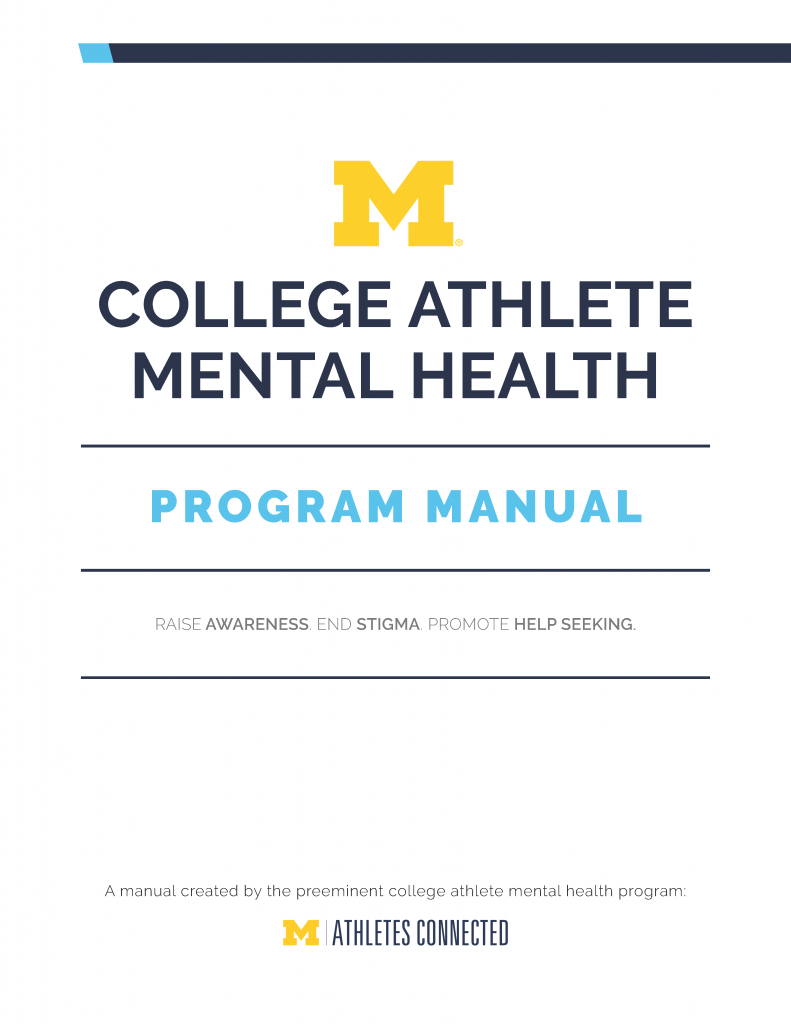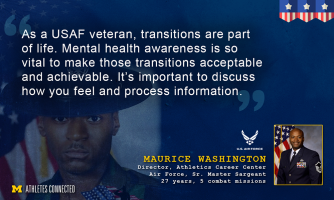
Athletes Connected continues its resource stories for athletes coping during the COVID-19 pandemic. This story is about dealing with long-term stress, fatigue and trauma as a student-athlete.
By Will Heininger, Depression Center Outreach Coordinator
Let’s state the obvious right away; we are going through some, uh… weird times. (Unprecedented has lost its meaning at this point.)
No one knows quite how to cope, or manage, or plan for what’s next, with so much uncertainty about the present and the future. What will the rest of this school year be like? When will there be a vaccine? When can I hug my loved ones again? When can we play our sport, and have a full season again? Will life ever get back to normal?
Uncertainty is often accompanied by stress. Loss is often accompanied by trauma. And prolonged stress often comes with fatigue. We know that the accumulation of stress over time–without proper outlets to alleviate that stress–is not good for our brains or our bodies, and can lead to more serious health conditions, including mental health issues.
Having the ability to tap into an inner state of calm, on demand, is an invaluable tool. Whether we’re feeling anxious about school, sports, social situations, or we just notice feeling worked up, practicing mindfulness proactively can help us navigate adversity as it arises.
So what can we do? How can we engage in our own lives, and approach our day-to-days in ways that minimize the accumulation of stress? Possibly even in ways that are enjoyable?
While there is no exact formula for wellness, the ideas below are based on evidence specifically related to stress, mental health, and well-being. As you read on, consider implementing one or more of the tool/strategies in your own life:
Managing Thoughts
Managing thoughts begins with noticing them in the first place. “What is my brain thinking? What thoughts are actually going through my mind?”
There is an abundance of evidence that our thoughts directly impact our feelings, or emotions, which then impact our choices, actions, and behaviors. We also know that as human beings, we experience ‘distorted’ or untrue thoughts, every single day. (Our brains aren’t perfect!) By noticing our thoughts up front, or seeing them at distance, we give ourselves a chance to evaluate those thoughts: “Is it true? Is it helpful? Is there a more accurate way I could rephrase it?”
Another way of approaching distorted, or troubling thoughts, is utilizing a “Best-Worst-Most Likely” approach, which allows us to consider a range of possible outcomes, as well as the probability of those outcomes.
Developing your Mindfulness Practice & Inner Calm
Simply paying attention to our thoughts is a form of practicing mindfulness in itself. Deep breathing is another way we can practice mindfulness, as are yoga, journaling, spending time in nature, listening to music, and even eating. There are countless ways to practice mindfulness, and tremendous benefits available when we do.
Mindfulness can help reduce rumination and stress, improve our focus, make us less emotionally reactive, more cognitively flexible, and even more satisfied in our relationships – among other benefits – according to the American Psychological Association.
Having the ability to tap into an inner state of calm, on demand, is an invaluable tool. Whether we’re feeling anxious about school, sports, social situations, or we just notice feeling worked up, practicing mindfulness proactively can help us navigate adversity as it arises.
Aligning Multiple Forms of Support
Just as a stool with only two or three legs – or supports – is less stable than a stool with five or six, having multiple forms of support in our lives can help keep us steady and balanced as individuals in the case that one or more is removed.
These supports, or legs of the stool to stick with the analogy, can and should be diverse in nature. Our sports can provide us support, both from the exercise, and from the meaningful relationships we develop.
Additional relationships, like those with our families, academic cohorts, and friend groups, provide further supports, as do healthy personal habits related to nutrition, sleep, and recovery. For many, regularly speaking with a mental health professional is a tremendous form of support, especially during turbulent times. Religious groups and spiritual practice serve as further examples.
Staying connected with friends and loved ones is a great way to strengthen those bonds, in the same way working out is a great way to strengthen your muscles. We cannot always control what happens in our relationships, just as we do not control when we get injured in our sports.
We can, however, proactively align multiple forms of support for ourselves. That way, in the unfortunate event that we lose one or more of our supports – or some legs of our stool become compromised – our stool is still standing, and we are able to cope, navigate adversity, and function effectively.
Additional Resources:
 About the Author
About the Author
Will Heininger is mental health educator and public speaker for the University of Michigan Depression Center, openly sharing his story of overcoming major depression and anxiety during undergrad, while playing football at Michigan. After hiding his illness at first due to stigma and ignorance, he received life-changing treatment and care from the Athletic Medicine staff, and was able to thrive for the majority of his time at Michigan. He would go on to help found Athletes Connected in 2014.
Since first sharing his story at the Depression on College Campuses Conference, Will has spoken with over 100,000 people across the country, helping to bridge the gap between what science and medicine have learned about mental health and well-being, and what society actually knows and uses. In addition to athletes of all levels, Will works with schools, athletic departments, communities, and corporations to improve mental health outcomes. Heininger is a native of Ann Arbor, Michigan.
 By Jeremy Fallis, U-M Depression Center Marketing Communications Specialist
By Jeremy Fallis, U-M Depression Center Marketing Communications Specialist


 Q: Obviously 2020 has been thrown for a loop. What are you doing to stay mentally well?
Q: Obviously 2020 has been thrown for a loop. What are you doing to stay mentally well?






 About the Author
About the Author